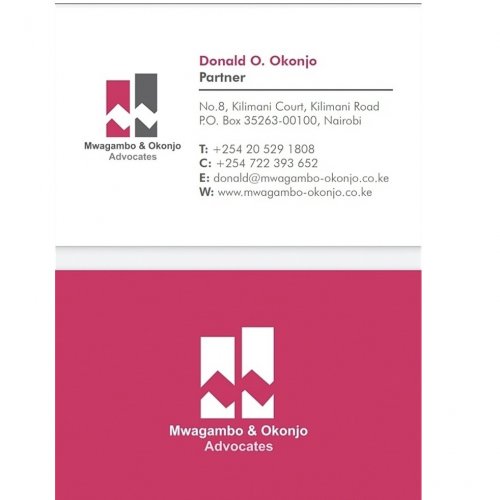Best Structured Finance Lawyers in Nairobi
Share your needs with us, get contacted by law firms.
Free. Takes 2 min.
List of the best lawyers in Nairobi, Kenya
Legal guides written by Adroit Law LLP:
- Kenya Launches Digital Nomad Visa: A Gateway for Remote Workers
- Navigating the Payment System License Maze in Kenya
- Navigating the Complexities of Mining Licenses and Permits in Kenya: A Look into Artisanal and Large-Scale Operations
About Structured Finance Law in Nairobi, Kenya
Structured finance refers to complex financial instruments and transactions that go beyond traditional lending and borrowing. In Nairobi, Kenya, structured finance is increasingly popular among banks, corporations, investment funds and infrastructure projects seeking to raise or manage large sums of capital. These arrangements often involve securitisation, syndicated loans, asset-backed securities, project financing, and other sophisticated vehicles designed to allocate risks and returns efficiently.
Given Nairobi's position as a key financial hub in East Africa, demand for structured finance has grown, especially with continued investments in real estate, energy, transport and technological innovation. As a result, structured finance law in Nairobi encompasses a blend of finance, banking, securities, tax, property, and insolvency regulations, all requiring specialist legal insight to structure and execute transactions effectively.
Why You May Need a Lawyer
Dealing with structured finance transactions often involves significant financial risks, regulatory compliance, and contractual complexities. You may need a lawyer in the following situations:
- When structuring or negotiating complex financial deals such as syndicated loans, securitisation, project financing, or asset-backed securities
- If you are a developer, investor, or lender in an infrastructure or real estate project
- When your business seeks new ways to raise capital or manage debt
- If you need to navigate Kenya's detailed regulatory requirements for financial services
- When reviewing or drafting documents such as loan agreements, security instruments or trust deeds
- If you are a foreign investor or international bank needing to understand local compliance and tax implications
- If a dispute arises between parties to a structured finance transaction
A skilled lawyer can help protect your interests, ensure regulatory compliance, and facilitate successful outcomes in these complex matters.
Local Laws Overview
Structured finance in Nairobi, Kenya is governed by a range of legal frameworks, including:
- Banking Act - Regulates banks, deposit-taking institutions and some aspects of lending and borrowing practices
- Capital Markets Act and Regulations - Oversees issuance and trading of securities, including asset-backed securities and securitisation transactions
- Companies Act - Governs the formation, management, and dissolution of companies involved in structured finance
- Insolvency Act - Addresses insolvency procedures and creditor rights
- Stamp Duty Act and Income Tax Act - Affect the tax treatment and duties payable on certain structured finance transactions
Regulators such as the Central Bank of Kenya and the Capital Markets Authority play a significant role in approving, supervising and licensing financial entities and transactions. Every structured finance transaction must comply with both statutory requirements and common law developed through court precedents. Legal advice is vital to ensure proper structuring, documentation and adherence to all applicable laws.
Frequently Asked Questions
What is structured finance?
Structured finance is a field of finance that uses tailored financial instruments and arrangements, such as securitisation or syndicated loans, to address the needs of borrowers and investors that may not be met by standard financial solutions.
Who participates in structured finance transactions?
Participants may include banks, investment funds, corporations, government agencies, project developers, investors, and financial advisors. Lawyers, accountants and credit rating agencies are often involved as well.
What are common types of structured finance products in Kenya?
Popular structured finance products in Kenya include syndicated loans, project finance (especially in energy and infrastructure), securitisation of receivables, real estate investment trusts (REITs), and asset-backed securities.
How is structured finance regulated in Nairobi, Kenya?
Structured finance transactions are regulated by laws such as the Banking Act, Capital Markets Act, Companies Act and overseen by regulatory bodies like the Central Bank of Kenya and the Capital Markets Authority.
Why do structured finance transactions need legal review?
Legal review ensures that transactions comply with all regulatory requirements, are properly documented, allocate risks correctly and are enforceable under Kenyan law, reducing the risk of costly disputes.
Can foreign investors participate in structured finance deals in Kenya?
Yes, foreign investors can participate but must comply with local registration, licensing and tax rules. Legal guidance is often necessary to navigate these requirements and structure transactions effectively.
What are the tax implications of structured finance?
Structured finance transactions may attract stamp duty, withholding tax, VAT or income tax depending on transaction type and structure. Each transaction should be individually assessed for tax compliance and efficiency.
How do disputes in structured finance transactions get resolved?
Disputes may be resolved through negotiation, mediation, arbitration, or litigation in Kenyan courts depending on the contract terms and nature of the disagreement. Dispute resolution clauses are critical in all agreements.
What is securitisation and is it allowed in Kenya?
Securitisation is the process of pooling financial assets and issuing new securities backed by those assets. Yes, it is allowed in Kenya and regulated under the Capital Markets Act with specific guidelines for issuers and investors.
How can a lawyer help with a structured finance transaction?
A lawyer can advise on structuring the transaction, drafting and reviewing documents, conducting due diligence, ensuring regulatory compliance, negotiating terms, and representing clients in case of disputes.
Additional Resources
If you are seeking more information or support, the following resources may be helpful:
- Central Bank of Kenya - Regulates banking and financial institutions, oversees payment systems
- Capital Markets Authority - Regulates securities and capital markets, approves certain structured finance products
- Law Society of Kenya - Provides directories and resources for finding qualified lawyers
- Nairobi International Financial Centre Authority - Supports the development of Nairobi as a financial hub and offers investor resources
- Kenya Bankers Association - Offers information relevant to banks and financial products
Next Steps
If you need legal assistance in structured finance, consider the following steps:
- Outline your objectives and gather relevant documents regarding your proposed transaction or issue
- Search for a lawyer or law firm with specialist experience in structured finance and Kenyan financial regulations
- Schedule a consultation to discuss your needs, potential risks, and available solutions
- Work with your lawyer to perform due diligence, review compliance requirements, and structure the transaction appropriately
- Ensure all agreements and documentation reflect your intended outcome and protect your interests
- If a dispute arises, promptly seek legal advice on resolution options and act within the advised timeframes
Engaging a qualified lawyer early in the process can help you avoid costly mistakes and ensure your structured finance transaction in Nairobi, Kenya is successful.
Lawzana helps you find the best lawyers and law firms in Nairobi through a curated and pre-screened list of qualified legal professionals. Our platform offers rankings and detailed profiles of attorneys and law firms, allowing you to compare based on practice areas, including Structured Finance, experience, and client feedback.
Each profile includes a description of the firm's areas of practice, client reviews, team members and partners, year of establishment, spoken languages, office locations, contact information, social media presence, and any published articles or resources. Most firms on our platform speak English and are experienced in both local and international legal matters.
Get a quote from top-rated law firms in Nairobi, Kenya — quickly, securely, and without unnecessary hassle.
Disclaimer:
The information provided on this page is for general informational purposes only and does not constitute legal advice. While we strive to ensure the accuracy and relevance of the content, legal information may change over time, and interpretations of the law can vary. You should always consult with a qualified legal professional for advice specific to your situation.
We disclaim all liability for actions taken or not taken based on the content of this page. If you believe any information is incorrect or outdated, please contact us, and we will review and update it where appropriate.

















